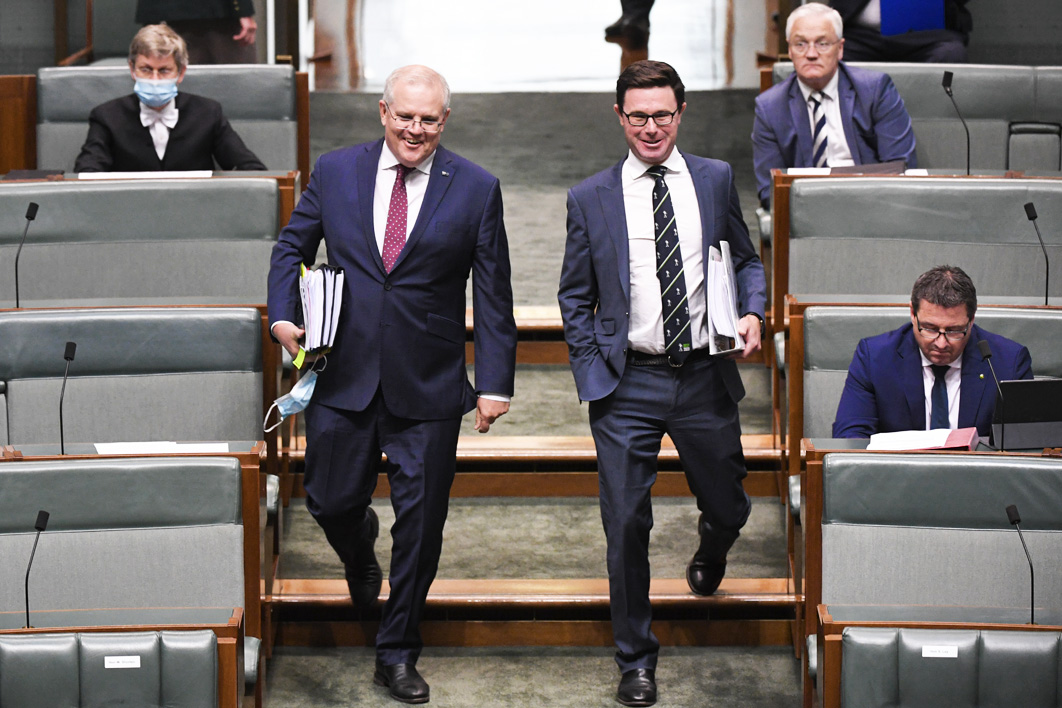It’s barely six weeks since prime minister Scott Morrison announced a Covid-19 recovery strategy based on a massively expanded use of natural gas in electricity generation and manufacturing. Yet the strategy is already so far removed from reality that it can’t possibly outlast the presidency of Donald Trump, who faces likely defeat in this week’s election.
At the time of its announcement on 15 September, the gas-fired recovery policy was hailed as an example of Morrison’s “middle course pragmatism.” This assessment was based entirely on domestic political calculations, with no consideration at all of the global implications.
The political problem was simple: how could the government appear to act on climate change without losing the support of the climate denialists and coal advocates who dominate the National Party and the government’s backbench? To the extent that the global implications were considered at all, the assumption was that the government could use accounting tricks to claim a 26 per cent reduction in emissions by 2030, and leave the future to take care of itself.
It took only a week for the wheels to start falling off that strategy. On 22 September, Chinese president Xi Jinping announced that his country would commit to zero net emissions by 2060. The announcement was almost certainly motivated by the likelihood that China would face new trade sanctions under a Biden administration if it failed to take decisive action to reduce emissions.
Then, last week, Japan announced a commitment to net zero emissions by 2050, with deep cuts by 2030, including the closure of coal-fired power stations that don’t use the most modern technologies, which are known as ultrasupercritical or integrated gasification combined cycle systems. That criterion would see the closure of all of Australia’s coal-fired power stations, most of which use ancient subcritical technology. Japan is still building some new coal-fired power stations, but the program has been scaled back sharply.
South Korea followed suit a few days later, also with a 2050 net zero commitment. More significantly perhaps, industrial heavyweights Samsung and Kepco entirely pulled out of the construction of coal-fired power stations. Having suffered serious reputational damage for their involvement in the Vũng Áng power station in Vietnam, the two companies announced they would not pursue any further coal projects.
If Joe Biden wins the US election as expected, he too will pledge his country to a 2050 target. Australia will be standing almost alone in the developed world, and against most of the developing world, in refusing to commit to stopping climate change. It’s hard to imagine any Australian government standing up to the pressure that will be generated as a result.
The problem for Scott Morrison is that none of this has got through to his own supporters, who are now almost completely disconnected from reality. This point may be illustrated by the hyperbolic reaction of agriculture minister David Littleproud to ANZ’s announcement that it will end its direct lending to coal-fired power generation and thermal coalmines — a policy that is actually weaker than that of most international financial institutions, which have already dumped coal.
Littleproud threatened to revoke the government’s deposit guarantees, which were introduced in response to the global financial crisis. If it were carried out, this threat would almost certainly generate a run on the affected banks. In the already fraught context of the pandemic, the financial system might well collapse.
This irresponsible threat by a senior government minister hasn’t been withdrawn. Yet no one has taken it seriously. Everyone understands, at some level, that the National Party, along with much of the political right, is now concerned more with culture-war posturing than any concept of government. Their reaction to even a symbolic commitment to ending net carbon emissions will be furious.
It’s hard to see how Morrison can resolve this problem. His successful management of the pandemic, following close on the heels of the catastrophic bushfires, presented him with the chance to radically reset the climate debate. Having embraced massive fiscal stimulus to deal with the pandemic downturn, he could have reinvented himself as a leader willing to ditch stale dogmas in order to deal with the real crises facing Australia. It’s hard to see how either the denialist right or the demoralised Labor opposition could have resisted him.
Instead, he has chosen what might have looked like the safe, middle-of-the-road course. But, as Texan populist Jim Hightower once observed, there’s nothing in the middle of the road but yellow stripes and dead armadillos. •




